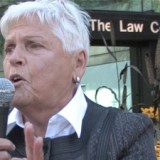Betty Krawczyk is a protester at the tender age of 82. Not long ago she was released from prison after serving 10 months for disobeying a court order.
How did this happen?
Through an abuse of power arising out of the government decision to take the Sea-to-Sky Highway over the top of Eagleridge Bluffs, a move bitterly fought by residents to no avail. Betty was sent to prison for defying a court injunction to stay away from the area which was being bulldozed to widen the highway ahead of the 2010 Winter Olympics.
Here’s how the system “works”. Betty, standing on public land, blocked machinery being used by Peter Kiewit & Sons, the huge construction company that for some reason does nearly all the government’s construction projects, so Kiewit went to court to get an injunction ordering Betty to stay away. Here’s the flim flam: this is a civil dispute but as soon as Betty disobeyed the injunction she was hauled before the Beak for criminal contempt of court. Betty was never permitted to discuss the merits of the construction decision by the Campbell government – the only issue is whether or not she disobeyed the court order.
All of a sudden Kiewit – and by extension the Campbell government – turned a civil dispute into a criminal case and this 79 year old (at the time) great grandmother was in the slammer for 10 months!
When Betty was finally released she launched an appeal because she thought the principle so important that she had to do so.
This past Wednesday her appeal was heard and the three judges concluded the proceedings with “judgement reserved” – meaning we will have to wait a little while longer to hear their verdict.
The Crown, on the instructions of the Campbell government cross-appealed and asked the court to follow two cases, both concerning repeated violent pedophiles who raped their own children. One case is entitled Regina v. C.A.M and the other is R.v. M (in the BC Court of Appeal).
Betty Krawczyk is to be compared to serious and violent pedophiles and dealt with accordingly!
In R.v.M. one judge’s opinion on the sentencing principle was:
“When an accused has been convicted of a serious crime in itself calling for a substantial sentence and when he suffers from some mental or personality disorder rendering him a danger to the community but not subjecting him to confinement in a mental institution and when it is uncertain when, if ever, the accused will be cured of his affliction, in my opinion the appropriate sentence is one of life.”
Can you believe it? Based on brutal pedophilia cases Gordon Campbell and his Attorney-General have asked the court to raise Betty’s sentence to LIFE IMPRISONMENT!!!
Nobody can be in any doubt as to the message here. This is intended to cow environmentalists into behaving themselves. Beware those who think they can speak freely and protest openly and effectively – we’ve a place for you and it’s called jail. And if you really make a nuisance of yourselves jail can be forever. So, be warned!
This will have precisely the opposite effect. It will galvanize the environmental movement into a unity of purpose that will mean that activism will mean just that – supporting Betty and, more importantly, following her example.
Let me pause here and explain what I mean by the environmental “movement”. It’s far more than tree huggers – though society owes them a huge debt of gratitude. It’s becoming mainstream British Columbians who, after a decade of being pushed around and lied to by the Pinocchio Campbell bunch, are fed up. It’s the jammed high school gymnasium in Pitt Meadows to protest the proposed damming of the Pitt River’s tributaries. It’s the town of Kaslo who had more people turn up to protest a government/industry so-called hearing than there were people living in the town! There is a sea change in the making here – the egregious environmental sins of this government are now becoming more and more apparent to people, good people, who want to trust their elected representatives but have been made fools of by doing it.
The job of education is scarcely over and this for a rather strange reason. The Campbell government’s policies are so outrageously bad that people think you’re kidding when you tell them about them.
After all, who would believe that a government would force BC Hydro to pay twice what the power is worth to private companies, that power being surplus to the needs of BC Hydro who must buy it anyway and then sell it at a huge loss? That’s loony tunes stuff! You are either kidding or telling a whopper!
Except it’s true. When I tell people that BC Hydro is on a fast track to suicide, assisted mightily by the Campbell crowd, no one can believe it! What sort of fools would do this?
C’mon, Rafe, give us a break! Get real!
Well, in fact it’s worse than that: BC Hydro, no longer making a profit so that they can pay their huge dividend to the BC treasury, will still pay that dividend.
How in hell can it pay a dividend when it’s losing money?
Easy. Simply raise the electricity rates to industry and the public then pay it back to them as a dividend!
What Betty Krawczyk has done is show this government for what it is – arrogant and utterly dishonest. Her courage is a prism through which ordinary citizens can see the reality of the Campbell crowd. Those who doubted or didn’t want to know what sort people these Liberals really are, look at them trying to throw an old lady in jail for life and all of a sudden what the environmental movement has been saying comes clearly into focus as the obvious truth.
This government’s attitude, so incredible as to be unbelievable has, because of the courage of this incredibly gutsy lady, is now there for all to see.
What we must now do is very difficult but it will be done. We must all unite in a political action group as is common in The United States. I’m not talking about a coalition – that’s impossible and not even a good idea. Each environmental group has its own special interest and that’s how it should be.
What must happen is all these groups, very much including The Common Sense Canadian, must present a united – and there’s no other honest word for it – attack on this government and make it clear that we will support no leader, no party, no candidate that will not express and put into action the ideals that we all believe in.
This cannot be simply a get rid of Campbell exercise – though that’s a hell of a good beginning – but a force to ensure that whoever replaces them clearly understands what the people of BC expect: the end of fish farms in our oceans, the end of paving over our farmland and wildlife preserves, the end of the destruction of our rivers and the end of killing the Fraser River because it’s cheaper to get gravel there than mine it safely and ship it to where it’s needed.
In short, Betty’s courage is the catalyst by which British Columbians can take back their province, restore what can be restored, and leave the rest intact for those yet to come.



